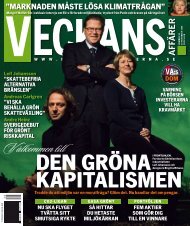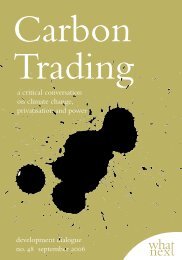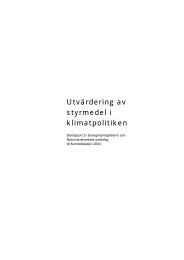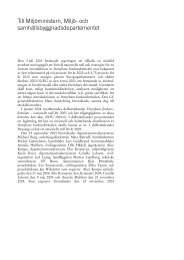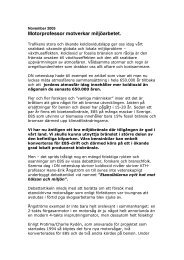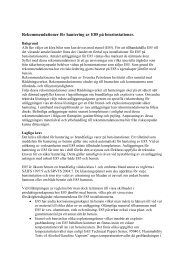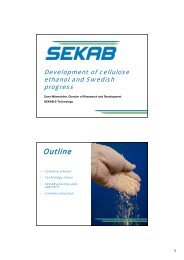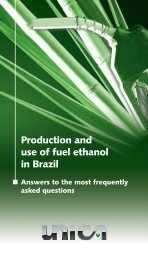Sugarcane ethanol: Contributions to climate change - BAFF
Sugarcane ethanol: Contributions to climate change - BAFF
Sugarcane ethanol: Contributions to climate change - BAFF
Create successful ePaper yourself
Turn your PDF publications into a flip-book with our unique Google optimized e-Paper software.
Chapter 8<br />
�e starting point for our prospective simulations is the updated, 2006 fuel economy which<br />
results from the foregoing his<strong>to</strong>rical analysis. �us, we analyze the impact of a continued<br />
intensi�cation of the use of biofuels in the economy treating the mandates as exogenous<br />
shocks. 12 Ethanol exports from Brazil <strong>to</strong> the US grow in this simulation as well.<br />
Table 1 reports the percentage <strong>change</strong>s in output for biofuels and the land-using sec<strong>to</strong>rs<br />
in the USA, EU and Brazil. �e �rst column in each block corresponds <strong>to</strong> the combined<br />
impact of EU and US policies on a given sec<strong>to</strong>r’s output (USEU-2015). �e second column<br />
in each block reports the component of this attributable <strong>to</strong> the US policies (US-2015), and<br />
the third reports the component of the <strong>to</strong>tal due <strong>to</strong> the EU policies (EU-2015) using the<br />
decomposition technique of Harrison et al. (2000). �is decomposition method is a more<br />
sophisticated approach <strong>to</strong> the idea of �rst simulating the global impacts of a US program,<br />
then simulating the impact of an EU biofuels program, and �nally, simulating the impact<br />
of the two combined. �e problem with that (rather intuitive) approach is that the impacts<br />
of the individual programs will not sum <strong>to</strong> the <strong>to</strong>tal, due <strong>to</strong> interactions. By adopting<br />
this numerical integration approach <strong>to</strong> decomposition, the combined impacts of the two<br />
programs are fully attributed <strong>to</strong> each one individually.<br />
In the case of the US impacts (columns labeled Output in US), most of the impacts on the<br />
land-using sec<strong>to</strong>rs are due <strong>to</strong> US policies. Coarse grains output rises by more than 16%, while<br />
output of other crops and lives<strong>to</strong>ck falls when only US policies are considered. However,<br />
oilseeds are a major exception. Here, the production impact is reversed when EU mandates<br />
are introduced. In order <strong>to</strong> meet the 6.25% renewable fuel share target, the EU requires a<br />
massive amount of oilseeds. Even though production in the EU rises by 52%, additional<br />
imports of oilseeds and vegetable oils are required, and this serves <strong>to</strong> stimulate production<br />
worldwide, including in the US. �us, while US oilseeds output falls by 5.6% in the presence<br />
of US-only programs, due <strong>to</strong> the dominance of <strong>ethanol</strong> in the US biofuel mix, when the EU<br />
policies are added <strong>to</strong> the mix, US oilseed production actually rises.<br />
In the case of the EU production impacts (Output in EU: the second group of columns<br />
in Table 1), the impact of US policies is quite modest, with the main interaction again<br />
through the oilseeds market. However, when it comes <strong>to</strong> third markets – in particular Brazil<br />
(Output in Brazil), the US and EU both have important impacts. US policies drive sugarcane<br />
production, through the <strong>ethanol</strong> sec<strong>to</strong>r, while the EU policies drive oilseeds production in<br />
Brazil. Other crops, lives<strong>to</strong>ck, and forestry give up land <strong>to</strong> these sec<strong>to</strong>rs.<br />
12 Technically, we endogenize the subsidy on biofuel use and exogenize the renewable fuel share, then shock<br />
the latter. For simplicity, all components of the renewable fuels bundle are assumed <strong>to</strong> grow in the same<br />
proportion.<br />
190 <strong>Sugarcane</strong> <strong>ethanol</strong>



